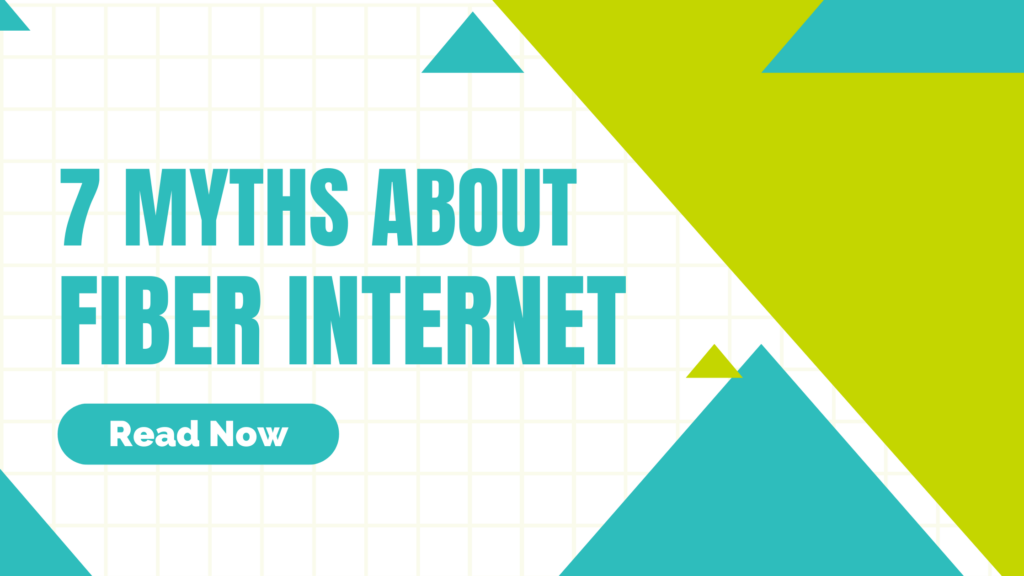7 Myths about Fiber Internet
April 21st, 2023

Even though it’s been around for decades, fiber-optic internet is still often seen as new technology, because of this there are often many misconceptions and myths that surround it. These myths often make fiber internet seem not as safe or reliable as traditional copper connections which couldn’t be further from the truth!
Let’s get into dispelling some of the most common myths surrounding fiber-optic internet connections!
Myth #1 – Fiber-optic cables are a fire hazard.
This myth couldn’t be further from the truth! Since fiber-optic cables use light to transfer data instead of electricity they actually generate less heat! This absence of heat makes them less likely to catch fire and less of a fire hazard than normal metal wires.
Myth #2 – Fiber-optic installation is super complicated.
We understand how this is a common misconception, especially if fiber infrastructure is new to your city! In places where fiber infrastructure is newly built out, there is often an extra step of installing conduit in your yard that will protect your fiber line. This is a necessary step to getting you connected, but once this conduit has been installed your fiber installation is just as easy and simple as getting a copper connection. You can learn more about what our installation process looks like by checking out our installation process page.
Myth #3 – Fiber-optic internet is less dependable.
This is another myth that couldn’t be farther from the truth. Fiber internet is actually one of the safest and most dependable ways to connect to the internet. Since fiber lines are made from glass strands and not copper metal, they are less likely to be affected by changing weather conditions that would cause metal wires to become brittle and break. This fact also makes them less likely to experience outages caused by weather conditions.
Fiber internet is also more dependable when it comes to surfing the web! Due to the fact that fiber uses light instead of electricity to transfer data, it emits no electromagnetic energy, which makes it harder for hackers to intercept and steal data.
Myth #4 – Fiber-optic internet is too expensive.
Because fiber is often perceived as new and high-quality it’s easy to assume that it is out of the price range for the average Joe. But in truth, there are a lot of fiber internet plans out there that can fit within every budget. On our network, we partner with several ISPs that offer a range of plans to fit every budget! You can learn more about how pricing works on our residential pricing page.
Myth #5 – Fiber-optic are not durable.
Since fiber-optic cables are made from glass it is easy to assume that they wouldn’t be as durable or strong as their copper metal counterpart. When in reality fiber-optic cables have more than 8x the pulling tension than a traditional copper wire. This paired with the fiber cable’s ability to handle temperature fluctuations and other extreme weather conditions make them super durable!
Myth #6 – Fiber-optic cables cannot bend.
It’s easy to assume that since fiber lines are made from glass they would shatter if they were bent, but the truth is that because of the way they are made fiber wires can be bent without the fear of it breaking! There are also several layers that go into creating fiber cables that help protect it from breakage!
Myth #7 – Fiber isn’t THAT much faster than copper.
To truly understand just how much faster fiber is than copper let’s talk numbers. On average a standard copper internet connection offers about 300 Mbps download speed with a theoretical max of 10 Gbps if you are willing to pay for it. On the flip side, while on a fiber network you can get a connection of anywhere from 250 Mbps to a max of 100 Gbps, and with fiber you know that you will be getting those speeds for your download AND upload not just download like with a copper connection.
We hope this has cleared up some of the most common misconceptions you might have heard about fiber internet! If you have more questions about the benefits of fiber internet and want to learn more about what it can do for you check out our website here.
